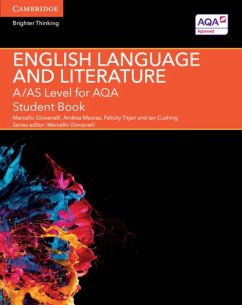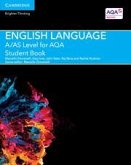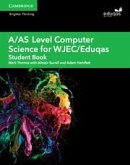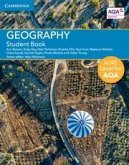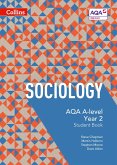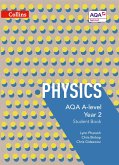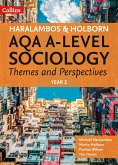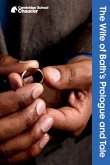Marcello Giovanelli, Andrea Macrae, Felicity Titjen
A/As Level English Language and Literature for Aqa Student Book
Herausgeber: Giovanelli, Marcello
Marcello Giovanelli, Andrea Macrae, Felicity Titjen
A/As Level English Language and Literature for Aqa Student Book
Herausgeber: Giovanelli, Marcello
- Broschiertes Buch
- Merkliste
- Auf die Merkliste
- Bewerten Bewerten
- Teilen
- Produkt teilen
- Produkterinnerung
- Produkterinnerung
A new series of bespoke, full-coverage resources developed for the 2015 A Level English qualifications.
Andere Kunden interessierten sich auch für
![A/As Level English Language for Aqa Student Book A/As Level English Language for Aqa Student Book]() Marcello GiovanelliA/As Level English Language for Aqa Student Book45,99 €
Marcello GiovanelliA/As Level English Language for Aqa Student Book45,99 €![A/As Level Computer Science for Wjec/Eduqas Student Book A/As Level Computer Science for Wjec/Eduqas Student Book]() Mark ThomasA/As Level Computer Science for Wjec/Eduqas Student Book55,99 €
Mark ThomasA/As Level Computer Science for Wjec/Eduqas Student Book55,99 €![A/AS Level Geography for AQA Student Book A/AS Level Geography for AQA Student Book]() Ann BowenA/AS Level Geography for AQA Student Book67,99 €
Ann BowenA/AS Level Geography for AQA Student Book67,99 €![AQA A Level Sociology Student Book 2 AQA A Level Sociology Student Book 2]() Steve ChapmanAQA A Level Sociology Student Book 246,99 €
Steve ChapmanAQA A Level Sociology Student Book 246,99 €![AQA A Level Physics Year 2 Student Book AQA A Level Physics Year 2 Student Book]() Lynn PharaohAQA A Level Physics Year 2 Student Book23,99 €
Lynn PharaohAQA A Level Physics Year 2 Student Book23,99 €![Aqa a Level Sociology Themes and Perspectives Aqa a Level Sociology Themes and Perspectives]() Michael HaralambosAqa a Level Sociology Themes and Perspectives45,99 €
Michael HaralambosAqa a Level Sociology Themes and Perspectives45,99 €![The Wife of Bath's Prologue and Tale The Wife of Bath's Prologue and Tale]() Geoffrey ChaucerThe Wife of Bath's Prologue and Tale27,99 €
Geoffrey ChaucerThe Wife of Bath's Prologue and Tale27,99 €-
-
-
A new series of bespoke, full-coverage resources developed for the 2015 A Level English qualifications.
Produktdetails
- Produktdetails
- A Level (AS) English Language and Literature AQA
- Verlag: Cambridge University Press
- Seitenzahl: 312
- Erscheinungstermin: 9. Juli 2015
- Englisch
- Abmessung: 276mm x 222mm x 17mm
- Gewicht: 710g
- ISBN-13: 9781107465664
- ISBN-10: 1107465664
- Artikelnr.: 41852582
- Herstellerkennzeichnung
- Libri GmbH
- Europaallee 1
- 36244 Bad Hersfeld
- gpsr@libri.de
- A Level (AS) English Language and Literature AQA
- Verlag: Cambridge University Press
- Seitenzahl: 312
- Erscheinungstermin: 9. Juli 2015
- Englisch
- Abmessung: 276mm x 222mm x 17mm
- Gewicht: 710g
- ISBN-13: 9781107465664
- ISBN-10: 1107465664
- Artikelnr.: 41852582
- Herstellerkennzeichnung
- Libri GmbH
- Europaallee 1
- 36244 Bad Hersfeld
- gpsr@libri.de
Introduction
BEGINNING: 1. What does the study of language and literature mean at A Level? 2. Text producers and receivers
3. Mode and genre
4. Variation, register and representation
5. Narrative
6. Language level 1: Lexis and semantics
7. Language level 2: Grammar
8. Language level 3: Phonetics, phonology and prosodics
9. Language level 4: Graphology
10. Language level 5: Pragmatics
11. Language level 6: Discourse
12. Analysing texts
13. Literature and literariness
14. Becoming an investigator
DEVELOPING: Introduction to Telling stories
15. Remembered places
15.1 Introduction to the anthology
15.2 Why Paris?
15.3 Remembering places
15.4 Re-creative writing and Remembered places
15.5 Places, people and events
15.6 Metaphor
15.7 Genre
15.8 Bringing it all together: AS Level
15.9 Bringing it all together: A Level
16. Imagined worlds
16.1 The fantasy genre
16.2 Setting up fictional worlds
16.3 Characterisation
16.4 Point of view
16.5 Interpretations of fantasy
16.6 Bringing it all together: AS Level
16.7 Bringing it all together: A Level
17. Poetic voices
17.1 Introduction
17.2 The set texts and approaching the poetry anthology
17.3 Analysing poetry from a language perspective
17.4 Voice
17.5 Voice in poetry through time
17.6 Language and poetic voice
17.7 Bringing it all together: AS Level
17.8 Bringing it all together: A Level
Introduction to Exploring conflict
18. Writing about society
18.1 Literature, society and re-creative writing
18.2 Re-creative writing, from the exploratory and experimental to the targeted and strategic
18.3 Commentary: analytical explanations of re-creative writing
18.4 Bringing it all together
19. Dramatic encounters
19.1 Exploring conflict
19.2 Representing turn-taking
19.3 Representing speech and meaning
19.4 Exploring dramatic conventions
19.5 Psychological and social drama: Williams, Miller and Kinnear
19.6 Creating characters
19.7 Power and positioning
19.8 The importance of politeness
19.9 Exploring themes
19.10 Bringing it all together
20. Making connections
20.1 What is Making connections?
20.2 Choosing connections
20.3 Thinking about texts
20.4 Thinking about non-literary connections
20.5 Thinking about topics
20.6 Choosing methodologies
20.7 Data collection methods
20.8 Ethical considerations
20.9 Working with spoken data
20.10 How much literary and non-literary material?
20.11 Devising research questions
20.12 Selecting language levels
20.13 Analysis: structuring connections
20.14 Reading and writing critically
20.15 Academic conventions: References
20.16 Exploring connections
20.17 Keeping context in mind
20.18 Bringing it all together
ENRICHING: 21. Remembered places
22. Imagined worlds
23. Poetic voices
24. Writing about society
25. Dramatic encounters
26. Making connections
References
Index
Acknowledgements
BEGINNING: 1. What does the study of language and literature mean at A Level? 2. Text producers and receivers
3. Mode and genre
4. Variation, register and representation
5. Narrative
6. Language level 1: Lexis and semantics
7. Language level 2: Grammar
8. Language level 3: Phonetics, phonology and prosodics
9. Language level 4: Graphology
10. Language level 5: Pragmatics
11. Language level 6: Discourse
12. Analysing texts
13. Literature and literariness
14. Becoming an investigator
DEVELOPING: Introduction to Telling stories
15. Remembered places
15.1 Introduction to the anthology
15.2 Why Paris?
15.3 Remembering places
15.4 Re-creative writing and Remembered places
15.5 Places, people and events
15.6 Metaphor
15.7 Genre
15.8 Bringing it all together: AS Level
15.9 Bringing it all together: A Level
16. Imagined worlds
16.1 The fantasy genre
16.2 Setting up fictional worlds
16.3 Characterisation
16.4 Point of view
16.5 Interpretations of fantasy
16.6 Bringing it all together: AS Level
16.7 Bringing it all together: A Level
17. Poetic voices
17.1 Introduction
17.2 The set texts and approaching the poetry anthology
17.3 Analysing poetry from a language perspective
17.4 Voice
17.5 Voice in poetry through time
17.6 Language and poetic voice
17.7 Bringing it all together: AS Level
17.8 Bringing it all together: A Level
Introduction to Exploring conflict
18. Writing about society
18.1 Literature, society and re-creative writing
18.2 Re-creative writing, from the exploratory and experimental to the targeted and strategic
18.3 Commentary: analytical explanations of re-creative writing
18.4 Bringing it all together
19. Dramatic encounters
19.1 Exploring conflict
19.2 Representing turn-taking
19.3 Representing speech and meaning
19.4 Exploring dramatic conventions
19.5 Psychological and social drama: Williams, Miller and Kinnear
19.6 Creating characters
19.7 Power and positioning
19.8 The importance of politeness
19.9 Exploring themes
19.10 Bringing it all together
20. Making connections
20.1 What is Making connections?
20.2 Choosing connections
20.3 Thinking about texts
20.4 Thinking about non-literary connections
20.5 Thinking about topics
20.6 Choosing methodologies
20.7 Data collection methods
20.8 Ethical considerations
20.9 Working with spoken data
20.10 How much literary and non-literary material?
20.11 Devising research questions
20.12 Selecting language levels
20.13 Analysis: structuring connections
20.14 Reading and writing critically
20.15 Academic conventions: References
20.16 Exploring connections
20.17 Keeping context in mind
20.18 Bringing it all together
ENRICHING: 21. Remembered places
22. Imagined worlds
23. Poetic voices
24. Writing about society
25. Dramatic encounters
26. Making connections
References
Index
Acknowledgements
Introduction
BEGINNING: 1. What does the study of language and literature mean at A Level? 2. Text producers and receivers
3. Mode and genre
4. Variation, register and representation
5. Narrative
6. Language level 1: Lexis and semantics
7. Language level 2: Grammar
8. Language level 3: Phonetics, phonology and prosodics
9. Language level 4: Graphology
10. Language level 5: Pragmatics
11. Language level 6: Discourse
12. Analysing texts
13. Literature and literariness
14. Becoming an investigator
DEVELOPING: Introduction to Telling stories
15. Remembered places
15.1 Introduction to the anthology
15.2 Why Paris?
15.3 Remembering places
15.4 Re-creative writing and Remembered places
15.5 Places, people and events
15.6 Metaphor
15.7 Genre
15.8 Bringing it all together: AS Level
15.9 Bringing it all together: A Level
16. Imagined worlds
16.1 The fantasy genre
16.2 Setting up fictional worlds
16.3 Characterisation
16.4 Point of view
16.5 Interpretations of fantasy
16.6 Bringing it all together: AS Level
16.7 Bringing it all together: A Level
17. Poetic voices
17.1 Introduction
17.2 The set texts and approaching the poetry anthology
17.3 Analysing poetry from a language perspective
17.4 Voice
17.5 Voice in poetry through time
17.6 Language and poetic voice
17.7 Bringing it all together: AS Level
17.8 Bringing it all together: A Level
Introduction to Exploring conflict
18. Writing about society
18.1 Literature, society and re-creative writing
18.2 Re-creative writing, from the exploratory and experimental to the targeted and strategic
18.3 Commentary: analytical explanations of re-creative writing
18.4 Bringing it all together
19. Dramatic encounters
19.1 Exploring conflict
19.2 Representing turn-taking
19.3 Representing speech and meaning
19.4 Exploring dramatic conventions
19.5 Psychological and social drama: Williams, Miller and Kinnear
19.6 Creating characters
19.7 Power and positioning
19.8 The importance of politeness
19.9 Exploring themes
19.10 Bringing it all together
20. Making connections
20.1 What is Making connections?
20.2 Choosing connections
20.3 Thinking about texts
20.4 Thinking about non-literary connections
20.5 Thinking about topics
20.6 Choosing methodologies
20.7 Data collection methods
20.8 Ethical considerations
20.9 Working with spoken data
20.10 How much literary and non-literary material?
20.11 Devising research questions
20.12 Selecting language levels
20.13 Analysis: structuring connections
20.14 Reading and writing critically
20.15 Academic conventions: References
20.16 Exploring connections
20.17 Keeping context in mind
20.18 Bringing it all together
ENRICHING: 21. Remembered places
22. Imagined worlds
23. Poetic voices
24. Writing about society
25. Dramatic encounters
26. Making connections
References
Index
Acknowledgements
BEGINNING: 1. What does the study of language and literature mean at A Level? 2. Text producers and receivers
3. Mode and genre
4. Variation, register and representation
5. Narrative
6. Language level 1: Lexis and semantics
7. Language level 2: Grammar
8. Language level 3: Phonetics, phonology and prosodics
9. Language level 4: Graphology
10. Language level 5: Pragmatics
11. Language level 6: Discourse
12. Analysing texts
13. Literature and literariness
14. Becoming an investigator
DEVELOPING: Introduction to Telling stories
15. Remembered places
15.1 Introduction to the anthology
15.2 Why Paris?
15.3 Remembering places
15.4 Re-creative writing and Remembered places
15.5 Places, people and events
15.6 Metaphor
15.7 Genre
15.8 Bringing it all together: AS Level
15.9 Bringing it all together: A Level
16. Imagined worlds
16.1 The fantasy genre
16.2 Setting up fictional worlds
16.3 Characterisation
16.4 Point of view
16.5 Interpretations of fantasy
16.6 Bringing it all together: AS Level
16.7 Bringing it all together: A Level
17. Poetic voices
17.1 Introduction
17.2 The set texts and approaching the poetry anthology
17.3 Analysing poetry from a language perspective
17.4 Voice
17.5 Voice in poetry through time
17.6 Language and poetic voice
17.7 Bringing it all together: AS Level
17.8 Bringing it all together: A Level
Introduction to Exploring conflict
18. Writing about society
18.1 Literature, society and re-creative writing
18.2 Re-creative writing, from the exploratory and experimental to the targeted and strategic
18.3 Commentary: analytical explanations of re-creative writing
18.4 Bringing it all together
19. Dramatic encounters
19.1 Exploring conflict
19.2 Representing turn-taking
19.3 Representing speech and meaning
19.4 Exploring dramatic conventions
19.5 Psychological and social drama: Williams, Miller and Kinnear
19.6 Creating characters
19.7 Power and positioning
19.8 The importance of politeness
19.9 Exploring themes
19.10 Bringing it all together
20. Making connections
20.1 What is Making connections?
20.2 Choosing connections
20.3 Thinking about texts
20.4 Thinking about non-literary connections
20.5 Thinking about topics
20.6 Choosing methodologies
20.7 Data collection methods
20.8 Ethical considerations
20.9 Working with spoken data
20.10 How much literary and non-literary material?
20.11 Devising research questions
20.12 Selecting language levels
20.13 Analysis: structuring connections
20.14 Reading and writing critically
20.15 Academic conventions: References
20.16 Exploring connections
20.17 Keeping context in mind
20.18 Bringing it all together
ENRICHING: 21. Remembered places
22. Imagined worlds
23. Poetic voices
24. Writing about society
25. Dramatic encounters
26. Making connections
References
Index
Acknowledgements

